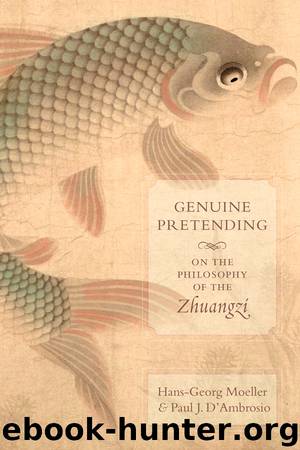Genuine Pretending by Hans-Georg Moeller

Author:Hans-Georg Moeller
Language: eng
Format: epub
Publisher: Columbia University Press
THE INCONGRUITY OF SINCERITY
In his final words to Confucius, Robber Zhi chastises the sage and chases him away: “Everything you say I reject. Away with you, quick, run back home, not a word more about it. Your way is crazy obsession, a thing of deception, trickery, vanity, falsehood. It will not serve to keep the genuine in us intact, what is there to discuss?” (Graham 2001, 239). Here, Robber Zhi summarizes very directly and thus not so humorously the Daoist critique of the implicit and unavoidable hypocrisy of the Confucian cultivation ideal and its insanity—it is denounced as a “crazy obsession” (kuangkuang jiji 狂狂汲汲). If our interpretation is correct, for the Zhuangzi the core object of criticism addressed here is the Confucian demand to personally verify (or personify) social roles. This ideal is accused of producing falsehood and of making people crazy and obsessed. Such an interpretation is supported by Chong Kim-Chong’s (2011, 330) previously mentioned observation that what the “Robber Zhi” chapter mockingly attacks is “the Confucian association of certain moral qualities with human nature,” if we are allowed to identify “certain moral qualities” as the Confucian value system expressed in social designations of roles and functions (i.e., the names). If moral values and role designations do not reflect human nature, then of course the attempt to prove them with one’s nature can produce only “crazy obsessions” as well as “deception, trickery, vanity, falsehood.” But if so, what is the “genuine in us” that Robber Zhi apparently intends to “keep intact”? (Although it is worth noting that he does not actually say so; he claims only that Confucius is unable to achieve genuineness, not that he, Robber Zhi, is himself able to.) Translated more literally, Robber Zhi speaks here of “complete genuineness” (quan zhen 全真), and interpreters often take this to be a Daoist notion of a pure or true sincerity or authenticity as opposed to a supposed Confucian insincerity or inauthenticity. Is the Daoist notion of zhen 真 necessarily a concept of authenticity? Is the zhenren 真人 in the Zhuangzi the authentic person? We do not think so and return to these questions in more detail later. At this stage, however, it may suffice to probe a little further into Robber Zhi’s character.
If our analysis is correct, Robber Zhi is not a good exemplification of any “complete authenticity.” As we pointed out, everything about Robber Zhi is incongruous: he is an exaggerated comical figure pairing, quoting Chong (2011, 343), an “utterly rough and violent character” with smartness, wit, and rebellious appeal. Given the thoroughly ambiguous and humorous characteristics of Robber Zhi, we can only assume that if he is actually meant to illustrate “complete genuineness,” then this very notion has to be understood as equally ambiguous or humorous. Robber Zhi is in fact anything but completely genuine—his form and name do not match—and thus “complete genuineness” may only mean here, ironically, a genuine rejection of any claim to sincerity. In a Socratically ironic fashion, only those who do
Download
This site does not store any files on its server. We only index and link to content provided by other sites. Please contact the content providers to delete copyright contents if any and email us, we'll remove relevant links or contents immediately.
4 3 2 1: A Novel by Paul Auster(12393)
The handmaid's tale by Margaret Atwood(7767)
Giovanni's Room by James Baldwin(7347)
Big Magic: Creative Living Beyond Fear by Elizabeth Gilbert(5775)
Asking the Right Questions: A Guide to Critical Thinking by M. Neil Browne & Stuart M. Keeley(5775)
Ego Is the Enemy by Ryan Holiday(5450)
The Body: A Guide for Occupants by Bill Bryson(5098)
On Writing A Memoir of the Craft by Stephen King(4945)
Ken Follett - World without end by Ken Follett(4734)
Adulting by Kelly Williams Brown(4576)
Bluets by Maggie Nelson(4559)
Eat That Frog! by Brian Tracy(4542)
Guilty Pleasures by Laurell K Hamilton(4450)
The Poetry of Pablo Neruda by Pablo Neruda(4110)
Alive: The Story of the Andes Survivors by Piers Paul Read(4033)
White Noise - A Novel by Don DeLillo(4012)
Fingerprints of the Gods by Graham Hancock(4005)
The Book of Joy by Dalai Lama(3986)
The Bookshop by Penelope Fitzgerald(3854)
